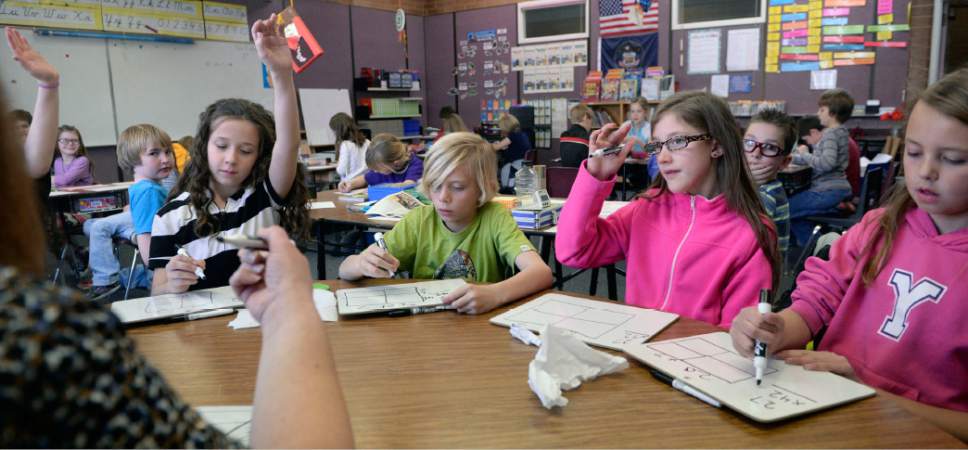This is an archived article that was published on sltrib.com in 2017, and information in the article may be outdated. It is provided only for personal research purposes and may not be reprinted.
Since November, a group of business and education leaders has pitched a seven-eighths of 1 percent income tax increase to Utah voters.
The initiative, known as Our Schools Now, is in the early stages of putting the question of a $750 million tax boost for public education spending on the November 2018 ballot.
But, as organizers prepare to submit their final ballot language and begin the laborious task of gathering signatures, the once-narrow guidelines of their tax proposal have begun to widen.
"We're considering any idea before we submit our final version of the initiative," Our Schools Now spokesman Austin Cox said on Friday. "Sales tax could be a part of that. Income tax could be a part of that. We're still looking at it and running numbers."
Our Schools Now's call for a higher income tax was effectively dead on arrival during the 2017 legislative session. Lawmakers debated but ultimately abandoned raising school funds through a series of revenue-neutral adjustments to the state's sales tax.
Their tax reform package, anchored in a proposal to hike the sales tax on food while lowering the overall sales tax rate, was opposed by various community groups that argued it would disproportionately affect low-income households.
Cox said Our Schools Now is not reacting to lawmakers' opposition to income tax reform. And the initiative has not shifted focus, Cox said, despite the relatively recent inclusion of sales tax adjustments in potential ballot language.
"They were discussing things that were going to be revenue-neutral. We support additional revenue for public education," Cox said. "We're looking at something the voters support, not necessarily what would pass through the Legislature."
The initiative's backers, an influential group of Utahns that includes former House Speaker Nolan Karras and Utah Jazz magnate Gail Miller, have said that boosting school funding is crucial to the longterm success of the state and its economy.
Utah's public education system is currently the lowest-funded in the nation on a per-student basis, and schools throughout the state are reporting a staffing shortage as teachers abandon the profession.
A recent report by the Utah Foundation found that tax policy has diverted roughly $1.2 billion in annual funding from public schools. And Cox remarked that a tax increase of $750 million would move Utah's school funding ranking from 50th "all the way to" 49th.
"Anything less than that is not going to ensure that we're preparing our students for the future," Cox said. "Even 750 million [dollars] isn't enough to solve the problems that we're in."
Voices for Utah Children CEO Lincoln Nehring said that if Our Schools Now chooses to include sales taxes in its initiative, it could run into issues of regressive taxation.
"Generally speaking, income taxes are easier to tailor to make sure there's greater equity in the tax system," he said, so "that it doesn't disproportionately fall on low-income families and individuals."
Wealthy individuals enjoy more flexibility with their income, Nehring said, with enough to cover basics and still have money to spend on savings, for example. Low-income families, meanwhile, are more likely to spend the bulk or entirety of their incomes on essentials, boosting their relative sales tax burden.
"They don't have much discretion in terms of what they buy," he said. "What they're purchasing are necessities."
In order to qualify for the 2018 ballot, Cox said Our Schools Now must submit its final ballot language and begin gathering signatures this summer. State law places several restrictions on ballot initiatives, including a requirement that signatures be gathered in at least 26 of Utah's 29 Senate districts.
A new law approved this year also requires that initiatives list both the effective rate change and the relative percentage change for tax adjustments, meaning 0.875 percent and 17.5 percent, respectively, in the case of Our Schools Now's proposed seven-eighths of 1 percent income tax hike.
Twitter: @bjaminwood



